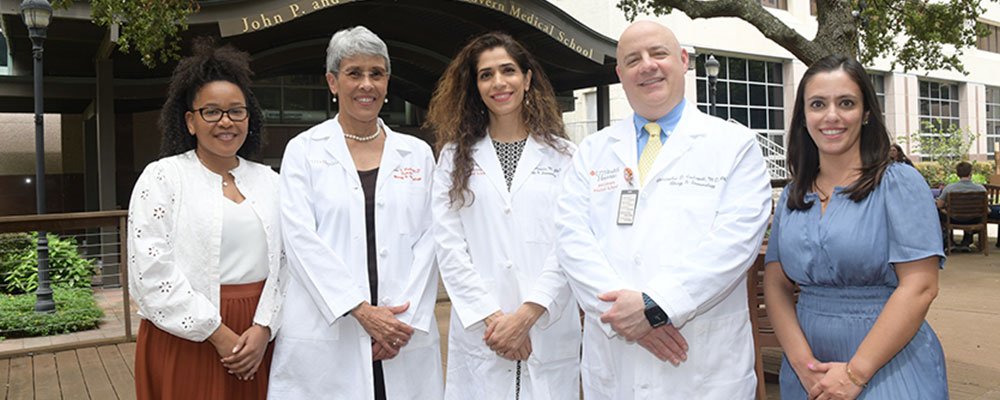UT Physicians brings clear vision to allergy care with new clinic

Donyea Moore, Susan Pacheco, MD; Mahboobeh Mahdavinia, MD, PhD; Christopher Codispoti, MD; and Ekta Perera, MD, are making a difference for Houston’s allergy population. (Photo by Dwight Andrews/McGovern Medical School at UTHealth Houston)
UT Physicians’ new allergy and immunology clinic provides a beacon of hope for Houston’s sneezing and wheezing masses. This progressive practice promises to do more than treat symptoms. It aims to educate Houstonians and develop effective prevention strategies for them.
Mahboobeh Mahdavinia, MD, PhD, professor and director of the newly established Division of Allergy and Immunology in the Department of Internal Medicine at McGovern Medical School at UTHealth Houston, is one of five physicians who opened the UT Physicians Allergy and Immunology clinic in August. It’s a new challenge for Mahdavinia, who moved from Chicago to lead this effort.
“In Houston, allergists encounter a wide range of allergic conditions and responses, providing a rich environment for research and practice,” said Mahdavinia, the John P. and Kathrine G. McGovern Distinguished Chair with McGovern Medical School. “Houston’s warm and humid climate also means that allergens are present throughout the year, compared to other places where allergies are seasonal.”
A vision for Houston’s unique challenges
Mahdavinia’s vision for the new clinic is targeted and strong: offer state-of-the-art treatments and approaches for all allergic and immune deficiency/dysregulation disorders. These include environmental, food and drug allergies, asthma, primary immunodeficiencies, macrocytosis, and more.
“My research on environmental health helps me identify how factors like pollution and climate change contribute to allergies,” said Mahdavinia, a board-certified allergist and immunologist. “My training in epidemiology helps me understand the patterns and causes of allergies in different populations.”
Her varied background offers a well-rounded approach to allergy and immunology care, which Mahdavinia can tailor to the unique needs of the community.
“Houston’s climate and environmental conditions might lead to different or more intense allergic reactions compared to Chicago,” Mahdavinia said. “We need more research in Houston to understand and address the interactive roles of diet, environment, and microbiome in allergic conditions.”
In addition to prioritizing a patient-centered approach, Mahdavinia said the clinic will provide comprehensive care and collaborate with a wide range of specialists, including dermatologists, otolaryngologists, pulmonologists, and emergency medicine physicians. This ensures that patients receive care that addresses all aspects of their health.
“I feel incredibly fortunate to be a physician with the opportunity to serve people and the community,” Mahdavinia said. “Everyone has been so passionate about helping us move forward; this kind of support is rare and invaluable.”